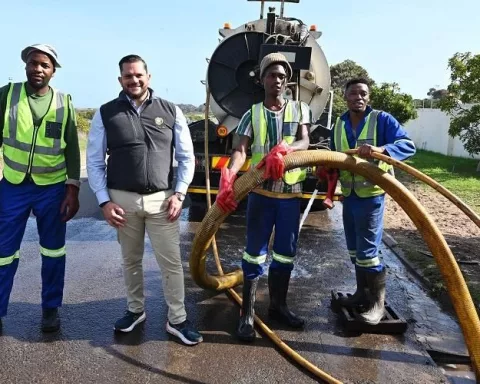South Africa’s upcoming elections offer the promise of strengthening democratic principles and paving the way for a fairer basic education system. The country has made significant progress in achieving near-universal access to education for 7 to 15-year-olds, and initiatives like the National Student Financial Aid Scheme and a focus on entrepreneurial skills further support education beyond the confines of schools. The North West Basic Education Lekgotla exemplifies the transformative power of unity and teamwork in enhancing the quality of basic education across the province, with a focus on infrastructure development and promoting STEM education.
Democracy’s Impact on Education Policies
The impending elections in South Africa carry the promise of strengthening democratic principles, paving the way for a more encompassing and fair basic education system. South Africa has made noteworthy progress in reforming basic education, with the aim of achieving near-universal access for the obligatory schooling age cohort of 7 to 15 years by 2021. The country’s commitment to education stretches past the confines of schools, with initiatives like the National Student Financial Aid Scheme and a focus on entrepreneurial abilities.
In the heart of a dynamic crowd, a significant event unfolds. Dr Makgabo Reginah Mhaule, Deputy Minister of Basic Education, stands before the audience at the Sun City Resort to present her keynote speech at the first North West Basic Education Lekgotla. The setting is filled with expectancy, as a diverse group of educators, administrators, community leaders and industry specialists from all corners of the country come together to plan and strategize the path of basic education in South Africa. This assembly represents much more than a simple gathering. It exemplifies the transformative strength of unity and teamwork, which are key drivers propelling the South African basic education sector towards a bolder and more transformative future.
Democracy’s Impact on Education Policies
These are crucial times for democracy in South Africa. The 30-year-old democratic system not only stands for liberty, peace and wealth but also serves as the platform on which the nation has systematically established its educational strategies. The impending elections on 29th May carry the promise of strengthening these democratic principles, paving the way for a more encompassing and fair basic education system.
South Africa’s progress in reforming basic education has been noteworthy. Transitioning from an inadequately financed and racially divided system, the nation has aimed to achieve near-universal access for the obligatory schooling age cohort of 7 to 15 years by 2021. This is no minor achievement. It reflects the country’s collective resolution to cultivate an inclusive educational setting, further strengthened by pro-poor policies that have significantly decreased the expenses related to school attendance. The National School Nutrition Programme (NSNP) and the growth of tuition-free schools have played a crucial role in accomplishing this.
Commitment to Education Beyond School Level
The nation’s commitment to education stretches past the confines of schools. The National Student Financial Aid Scheme (NSFAS) is a vivid demonstration of this dedication. Since its establishment in 1995, the NSFAS has witnessed remarkable growth, offering financial support to more than 1.2 million students as of March 2024.
Dr Mhaule stresses the value of entrepreneurial abilities in the rapidly changing present-day economy. These skills encompass more than just business insight. They form the foundation for driving innovation, tackling complex issues, and unlocking new opportunities. This comprehension underscores the necessity for a basic education system that cultivates these traits among students.
The Lekgotla: A Confluence of Ideas and Strategies
The Lekgotla represents more than a mere assembly. It is a merging of ideas and plans, a stage for collective wisdom and decision-making. The goal is evident: to enhance the quality of basic education across the North West Province. This year’s theme, “Strengthening and Reaffirming Progressive Partnerships in Education”, perfectly captures this joint vision. The objective is to establish sturdy collaborations across different sectors, enabling the education system to adapt to the changing times and effectively incorporate technology into classrooms.
Remarkable Progress in Basic Education
The North West Province has displayed substantial progress in basic education. An ambitious performance target of 90% has been established for the academic year 2024, a noticeable increment from the previous year’s output. Despite obstacles, the province’s determination to meet these targets remains steadfast. The focus is on increasing support for learners, particularly in foundational skills within the Further Education and Training (FET) feeder subjects in Grades 8 and 9.
The focus on Mathematics has been particularly noticeable. After years of results in the 50s range, 2023 was declared the Year of Mathematics, with an ambitious goal of reaching a 60% performance rate. Exceeding this target has been a substantial accomplishment. However, the province still faces a challenge: the participation rates in Mathematics remain low, with nearly 80% of learners choosing Mathematical Literacy in Grade 12.
Aligned with the National Development Plan (NDP), the sector aims to boost the number of learners obtaining bachelor’s qualifications, thereby enabling them to pursue Mathematics and Science-based degrees. The focus is on enhancing pass rates and delivering a holistic educational experience that equips students with the skills needed to thrive in the 21st century. Furthermore, there is a sustained emphasis on promoting STEM education, fostering digital literacy, and aligning vocational training with the economic requirements of the North West and South Africa as a whole.
Infrastructure Development: A Key Focus
Infrastructure development has been a major area of focus. The province has unveiled 18 new schools, added more classrooms, upgraded sanitation facilities, and performed maintenance work across several schools. Future plans include constructing 21 additional new and replacement schools, adding more classrooms, and upgrading sanitation facilities. The introduction of advanced ICT in schools has further enhanced learning environments, fostering the development of digital skills among students.
Dr Mhaule concludes her speech expressing gratitude, acknowledging the attendees for their enthusiasm and dedication to education. The first North West Basic Education Lekgotla is not just a gathering. It represents the collective vision and efforts propelling a transformative shift in South Africa’s basic education system.
1. How will the upcoming elections impact South Africa’s basic education system?
The elections carry the promise of strengthening democratic principles and paving the way for a fairer basic education system in South Africa.
2. What initiatives support education beyond the confines of schools in South Africa?
Initiatives like the National Student Financial Aid Scheme and a focus on entrepreneurial skills support education beyond the confines of schools in South Africa.
3. What is the North West Basic Education Lekgotla?
The North West Basic Education Lekgotla is an assembly of educators, administrators, community leaders, and industry specialists from all corners of the country who come together to plan and strategize the path of basic education in South Africa. It is a merging of ideas and plans, a stage for collective wisdom and decision-making.
4. What is the focus of the Lekgotla in enhancing the quality of basic education across the North West Province?
The focus of the Lekgotla is to enhance the quality of basic education across the North West Province by establishing sturdy collaborations across different sectors and enabling the education system to adapt to the changing times and effectively incorporate technology into classrooms.
5. What is the focus of infrastructure development in South Africa’s basic education system?
Infrastructure development has been a major area of focus in South Africa’s basic education system. The focus is on constructing new schools, adding more classrooms, and upgrading sanitation facilities. The introduction of advanced ICT in schools has further enhanced learning environments.
6. What is the focus of South Africa’s basic education system beyond the confines of schools?
South Africa’s commitment to education stretches past the confines of schools. The focus is on initiatives like the National Student Financial Aid Scheme and a focus on entrepreneurial abilities. The country aims to cultivate a basic education system that cultivates entrepreneurial skills among students and fosters digital literacy. There is also a sustained emphasis on promoting STEM education and aligning vocational training with the economic requirements of the North West and South Africa as a whole.











